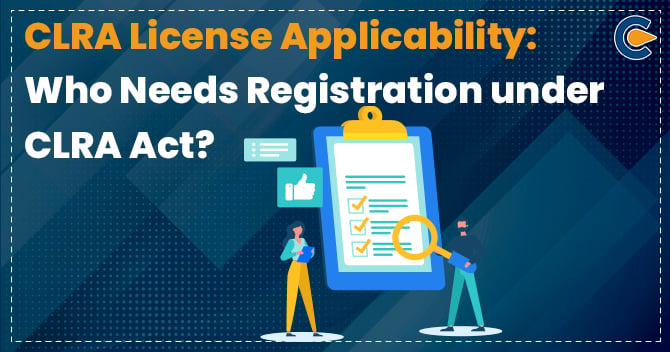The Contract Labour (Regulation & Abolition) Act, 1970[1], also known as the CLRA Act, regulates the employment of contract workers and provides for the abolition of a contract worker in some instances. The question of CLRA License Applicability to an establishment frequently becomes a matter of concern for employers. In this write-up, we will discuss CLRA License Applicability.
What is the CLRA Act?
According to the CLRA Act in India, all contract workers are indirect employees of the establishment or organisation where a contractor has hired them. Any establishment or organisation that employs contract workers must be registered under this Act and require a CLRA License to continue its hiring procedure.
A Brief Overview of CLRA License Applicability
Employers may use the following information as a guide in these situations:
- The CLRA Act applies to all establishments where 20 or more 20 workers are employed as contract workers or were employed anytime during the last 12 months. Hence, the CLRA Act would become applicable once 20 or more workers are employed as contract workers on any day in an establishment during the preceding 12 months.
- The CLRA Act applies to every establishment and labourer if the workers are contracted. Section 2(b) of this Act provides that workers shall be deemed to be employed as contract workers when they are hired in or in connection with the work of an establishment by the contractor. Such engagement of contract workers may be with/without the knowledge of the Principal Employer. Whether the worker is employed to do any skilled, unskilled manual, supervisory, technical or clerical work for hire and reward is immaterial for deciding upon the CLRA License Applicability.
- This Act does not cover establishments where work is only of a sporadic or casual character. Section 1(5) of this Act further provides that work performance would be deemed irregular in case it was performed for less than 120 days in the preceding 12 months or is non-seasonal and performed for less than 60 days in a year.
- Where the issues arise as to the CLRA License Applicability to the contractor, the same would depend on the following aspects:
- Whether there exists an open contract between the Principal Employer and contractor.
- Whether the periodicity & nature of services given by such contractor to the principal employer’s establishment are intermittent.
- At the worker level, the CLRA Act does not apply to people primarily engaged in an advisory or managerial capacity. In the case decided by the Calcutta High Court (Mcleod and Co. v. Sixth Industrial Tribunal, West Bengal & others, AIR 1958 Cal 273), while interpreting the expression managerial, administrative, & supervisory, the Hon’ble Court noted that the primary work of a person who is essentially engaged in an advisory or organisational capacity would include supervision. But, it wouldn’t mean that supervision would be the only function of a manager or an administrator. Therefore, another test which could be considered to determine whether any supervisory work was performed while discharging administrative or managerial position is to ascertain if the people were assigned with the duties or responsibilities of distribution of work & power to sanction or refer leave, shifty schedule, increment, authority to permit late comer, ability to allow a person to leave early, etc.
Procedure for obtaining CLRA License
Following are the steps for obtaining a CLRA License online:
- The contractors must fill out the application for a license in Form No-IV.
- Put a request to the Licensing Authority along with the application.
- A security fee needs to submit at the time of application.
- The receipt of the payment is paid to send to the licensing officer.
- Certificate by the principal employer in Form-V, stating that he employs the applicant as the contractor for his establishment.
- The licensing officer grants a license in Form-VI after making the necessary checks.
- You can renew the CLRA License from time to time.
The responsibilities of the CLRA Act, its registration and license are an ambiguous relationship between the principal employer and contractor, ensuring that all the requirements are fulfilled, and workers get fair work.
Violation of CLRA and Penalties
According to the CLRA Act, a principal employer is not permitted to hire a contract worker unless they have received a CLRA registration with the appropriate Department. The principal employer shall be punished with jail for up to three months. He can also punish with a fine of Rs.1000/- 0r with both, in case of a violation, under Section 23 of this Act.
Conclusion
Exclusion from the CLRA License Applicability is contingent upon the nature of work in the establishment and the capacity in which an individual is employed in or in connection with the outcome of any establishment. The exact needs to be examined by the employer on a case-by-case basis.
Read our Article:Key Highlights of the CLRA Act











